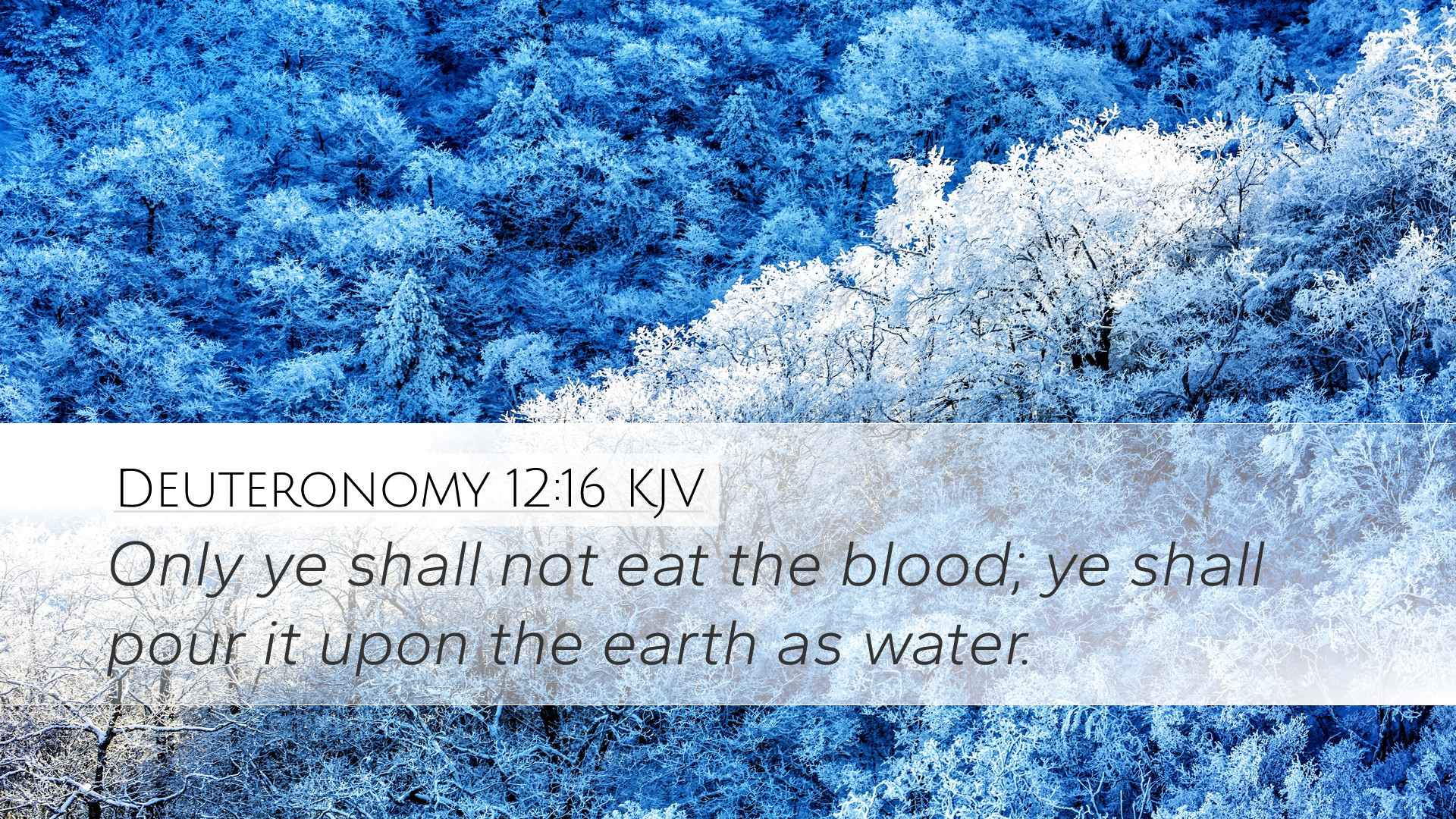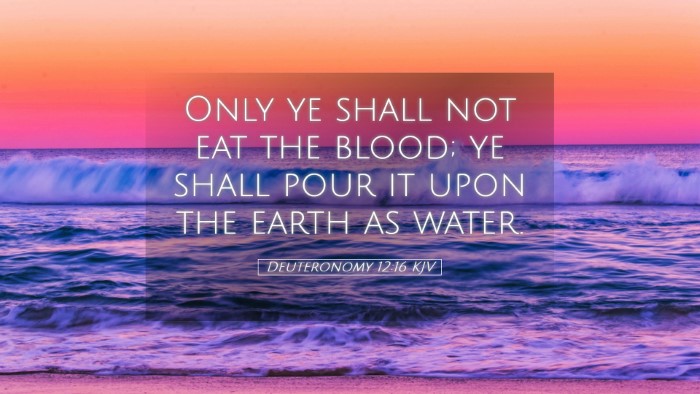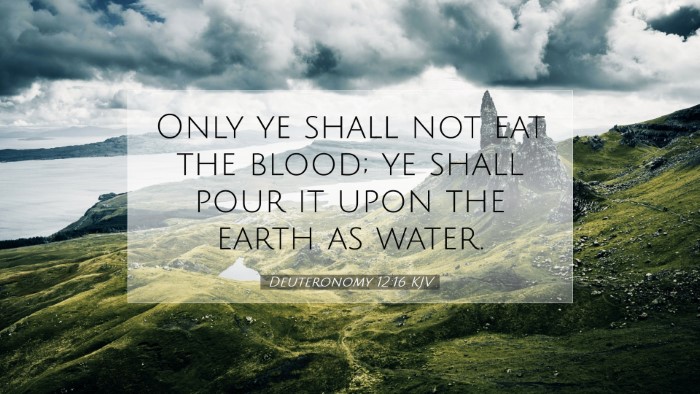Commentary on Deuteronomy 12:16
Deuteronomy 12:16 states: "Only ye shall not eat the blood; ye shall pour it upon the earth as water." This verse is part of a larger discourse wherein Moses, addressing the Israelites, lays down commands regarding their worship and rituals as they prepare to enter the Promised Land. The prohibition of consuming blood is significant in the broader context of Israelite sacrificial practices and their understanding of life and atonement.
Contextual Analysis
Moses emphasizes to the children of Israel the importance of obedience to God's commandments. Blood, mentioned here, symbolizes life, and its proper handling is critical in the covenantal relationship between God and His people. The context of this command arises from the sacrificial system that defines the worship in ancient Israel.
Insights from Public Domain Commentaries
Matthew Henry's Commentary
Matthew Henry notes that the prohibition against consuming blood is rooted in theological and ethical considerations. He asserts that blood is distinguished for its sacredness, primarily because it represents the life force within the body. In his commentary, he elaborates:
- Blood as Life: Henry emphasizes that blood is the life of the flesh (Leviticus 17:11). It is attributed to God’s ownership of life. Therefore, consuming blood would be an act of disobedience against divine authority.
- Symbol of Atonement: Blood in the sacrificial system has a profound significance that relates to atonement for sin. Handling blood improperly negates its sacred role in the covenant relationship.
- Respect for God's Commands: The Israelites are reminded to respect God's decrees in worship and sacrifice. The pouring out of blood is a symbolic act of returning life to God, acknowledging His sovereignty over it.
Albert Barnes' Notes on the Bible
Albert Barnes provides additional insights regarding the ritualistic nature of blood handling in the Israelite culture. His thoughts include:
- Divine Instruction: Barnes indicates that the instruction to pour out blood "upon the earth as water" signifies a gesture of respect towards God’s laws. It underscores the importance of obedience in the worship life of Israel.
- Cultural Practices: The prohibition against consuming blood is contrasted with the practices of surrounding nations, who often engaged in rituals involving blood consumption. This marks a clear boundary set by God for His people.
- Covenantal Implications: Barnes emphasizes that the restrictions placed by God were not arbitrary but were rooted in the need to maintain the sanctity of the covenant. The Israelites were called to be distinct as God’s chosen people.
Adam Clarke's Commentary
Adam Clarke enriches the discourse by providing a historical perspective on the blood practices of neighboring nations and the unique stance of Israel:
- Historical Context: Clarke asserts that many cultures practiced blood consumption as part of their religious rites, often engaging in pagan worship. By prohibiting this, God sets Israel apart as a nation dedicated to His holiness.
- Spiritual Significance: Clarke also highlights the spiritual dimension of blood, connecting it to future revelations in the New Testament regarding Jesus’ sacrifice. He views the edict in Deuteronomy as a foreshadowing of Christ’s atoning work.
- Food and Spirituality: The expulsion of blood reflects a larger theme of recognizing personal separation from the unclean practices existing in the world, affirming that worship must be aligned with God’s righteousness.
Spiritual and Theological Reflections
As one meditates on Deuteronomy 12:16, various theological implications arise that hold significant meaning for contemporary believers, pastors, and scholars:
1. The Sanctity of Life
The primary theological principle derived from this verse is the sanctity of life. The command not to consume blood emphasizes God's ownership of life and the moral imperative to treat life with reverence.
2. Obedience to Divine Law
In a broader sense, this command underlines the necessity of adhering to divine instruction. For pastors and leaders, this reinforces the importance of leading congregations in understanding and respecting Scripture's guidance.
3. Community and Identity
Through this commandment, Israel’s identity as a covenant community is highlighted. Observing dietary laws fosters unity and distinguishes them from other nations, a principle that resonates with the church today regarding cultural and spiritual identity.
4. Foreshadowing Redemption
From a Christocentric perspective, the handling of blood in the Old Testament foreshadows the ultimate redemption offered through Jesus Christ. The New Testament illuminates how Jesus is the fulfillment of the sacrificial system where His blood brings atonement and reconciliation.
Conclusion
The command from Deuteronomy 12:16 carries profound implications for the Israelite community and offers rich theological insights for believers today. Understanding the sanctity of blood, the importance of obedience to God, and the identity it confers reinforces the enduring relevance of Scripture. As students and scholars of theology engage with this text, they uncover layers of meaning that enhance their comprehension of God's plans throughout salvation history.


